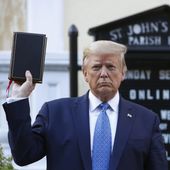OPINION:
The shutdown has probably hurt President Trump less than conventional wisdom believes. First, remember: Many claiming it has want that to be true. Second, there are several strong reasons why it will not when it really matters: 2020.
Two realities regarding federal government shutdowns bear repeating up front. One is that there is never a good time for one. The other is that — until proven otherwise — they do not favor Republicans.
For most Americans, the government thankfully does not have a daily discernable impact on their lives. They simply expect it to function, and when it does not, something is wrong. For the left, who love government in unlimited amounts, shutdowns will always aggrieve them. The net effect is that only a minority will ever favor one.
This adversely skewed shutdown ground will be covered by a slanted establishment media. This group, which also loves government and has ignored the effect of illegal immigration for decades — refusing to even label it that — can hardly be expected to fairly cover a government shutdown aimed at stopping it.
Against these shutdown generalities, Mr. Trump has predictably paid a price. Rasmussen polling shows Mr. Trump’s approval/disapproval was 45/54 percent on Friday, Jan. 25 vs. 49/50 percent on Dec. 21, the day before the shutdown started. That negative 4 percent swing is unwelcome, but hardly unsalvageable. Recall: Mr. Trump won the presidency with just 46 percent of the popular vote. Despite the shutdown, Mr. Trump is essentially where he was the day he won the election.
The reason the shutdown’s generalities have not been more negative is because of this one’s mitigating particularities.
First, the shutdown is not over; it’s suspended. What the interim delivers will yield the final verdict. Any additional money for border security Mr. Trump will claim as a win, because until now, it is clear Democrats did not intend to give any. Absent any, Mr. Trump can revisit his earlier expressed intent to examine declaring a national emergency. If used correctly, the current ceasefire will allow him to reframe the debate — and his opponents.
Second, some fights are worth having, even if you lose. Mr. Trump made commitments to his base on several issues — replacing ObamaCare, reforming trade, reinvigorating the economy and stopping illegal immigration. By throwing down the gauntlet on border security, he shows he has actually tried to deliver them all. There is value in that — as Bush I’s broken “no new taxes” pledge proved in reverse. As Mr. Trump’s poll numbers show, his base has not deserted him so far; much of that may be due simply to the fact that he fought.
Further, the big determinant of presidential elections is the economy. In the last century, only three elected presidents who sought re-election have lost: Herbert Hoover, Jimmy Carter, and George H.W. Bush. All three had negative annual GDP growth within a year of their loss. Mr. Trump has a good economy — particularly in comparison to his predecessor’s — bordering on great. It is his ace in the hole, and will play a far bigger part than an almost 2-year old shutdown.
The corollary to elected incumbents winning re-election with good economies is that they also almost always increase their popular vote percentage. Since FDR’s run for an unprecedented third term in 1940, no elected incumbent saw his re-election popular vote percentage fall, until Barack Obama’s in 2012. Mr. Trump has a strong economy now, and any increase in his popular vote percentage — especially considering he won the electoral vote handily — could make him particularly hard to beat in 2020.
For Mr. Trump to lose in 2020, Democrats first must nominate someone to beat him. That is easier said than done. An establishment and relatively moderate Democrat would be an ideal start; however, they tried that in 2016 — and lost. Doing so again with their increasingly leftward lean and their new anti-establishment nominating rules will be far more difficult — even if they had a deep bench (they don’t) from which to pick. Mr. Trump vs. the left is the best re-election race he could choose.
There is never a good time for Republicans to have a government shutdown and lose it (at least thus far). If Mr. Trump intended to have it, almost two years before re-election is among the least bad times. And doing so, best to do so with several sustaining assets — a seemingly resilient base and resurgent economy would be at the top of that list.
Finally, any president’s mistake is only as serious as he can be held accountable for it. That accountability comes at re-election, and the person to hold him so must be his opponent. It is far from clear that Democrats can hold Mr. Trump accountable in 2020 — and even less so that his opponent then, will be as formidable as his current ones.
• J.T. Young served in the Treasury Department and the Office of Management and Budget.




Please read our comment policy before commenting.